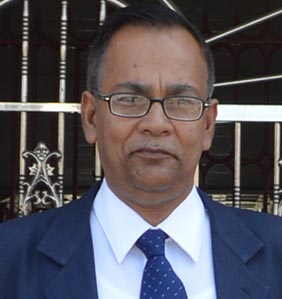Auditor General Deodat Sharma says that he has no role in relation to auditing cost oil expenses and his office is only involved with audits relating to the petroleum sector where the Guyana Revenue Authority (GRA) had granted tax exemptions.
Sharma was asked about his role in light of a growing scandal over unauthorised attempts by ExxonMobil and personnel of the Ministry of Natural Resources to slash a US$214m figure which UK audit firm IHS Markit said could be disputed.
And even as he distanced himself from being a part of any of the two audits of ExxonMobil’s spending for works in the Stabroek Block, the Auditor General says that his office is now equipping itself to focus on inspection of accounts relating to the sector.
“No role,” Sharma said when asked recently by Stabroek News to explain the role of the Audit Office in relation to auditing cost oil expenses claimed by operators in the respective blocks.
“We only audit matters related to the oil and gas sector when they are given exemptions by GRA,” he explained.
Sharma also pointed out that his office “did not participate in any of the two audits” of different periods of ExxonMobil expenses.
However, he said that he is still building capacity to ensure that his office has the requisite skills to properly inspect the accounts relating to the sector. “We are now setting up a separate department to audit matters related to the oil and gas sector”, he said.
Following revelations that ExxonMobil had engaged in unauthorised discussions with the Ministry of Natural Resources on reducing the size of disputed cost oil expenses from US$214m to US$3m, President Irfaan Ali has ordered an investigation. Thus far there has been no word from the Office of the President about who will be conducting this investigation.
The final version of the IHS Markit report after reconciliations was submitted to the PPP/C government in March 2021. That report remained hidden from public view until a news item on its findings appeared in the Sunday Stabroek in April this year.
Among the major findings in the audit report was that 12.8% of the US$1.67b expenses claimed by ExxonMobil and its partners could be disputed by the Guyana Government. The percentage that can be queried translates to US$214.4m – roughly one fifth of the amount injected into this year’s budget from oil and gas revenues.
The government had remained mostly silent on it until Stabroek News revealed that the GRA had written to the Ministry of Natural Resources in August this year stating that the US$214m figure would not be challenged and recommending that the audit be finalised. In the intervening period ExxonMobil and staff of the ministry had whittled down the figure from US$214m to US$3m. This figure was relayed by senior government officials and ExxonMobil until it was finally realized that the GRA was not a part of the process and it was therefore unauthorised.
With the US$214m now accepted as disputed, Guyana can claim half of this as profit that is due to it.
In September 2018, Sharma had said that two Canadian experts were to assist the Audit Office to build its capacity in preparation for the oil and gas industry.
Sharma made the disclosure at the handing over of the 2017 Auditor General’s report to the Speaker of the National Assembly, Dr Barton Scotland, at which point he had also expressed an interest in auditing the US$18 million signing bonus government received from ExxonMobil.
Reading from a prepared statement, he said that as the oil and gas sector dawns, his office is aware that it is massive and diverse. In this regard, he said, the Audit Office, through a partnership with the Canadian Executive Services Organisation, would be engaging in capacity building initiatives in the coming weeks.
“More specifically, we would be looking at the various areas in the oil and gas sector that may be relevant to our engagement when it comes to examining the revenues and expenditures of the sector,” he said. Sharma added then that these include regulatory, technical and even scientific areas.




